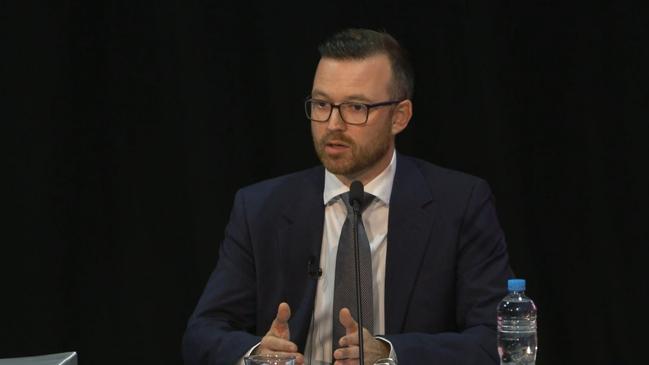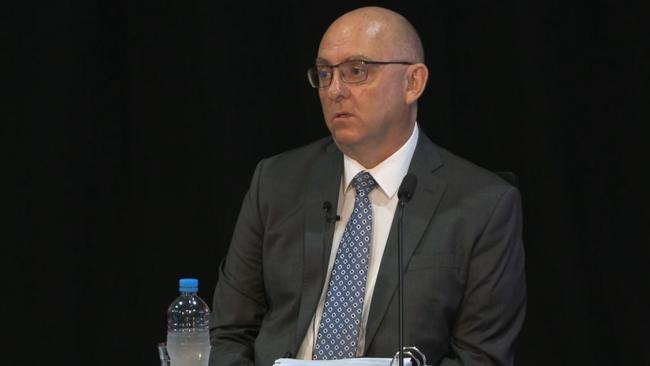‘Lawful as a longstanding practice’: Minister’s ex-CoS makes shock concession on robodebt
The former chief of staff for then-human services minister Alan Tudge has made a shock admission about the disastrous robodebt recovery scheme.
NewsWire
Don't miss out on the headlines from NewsWire. Followed categories will be added to My News.
The former chief of staff for ex-human services minister Alan Tudge has told a royal commission into the disastrous robodebt scheme the income averaging process was a “longstanding practice” despite questions about its lawfulness being raised.
Senior staff in the DHS and Mr Tudge’s office at the time were among five witnesses to give evidence on Monday, as the royal commission into the bungled debt recovery program entered its final stretch.
Mr Asten, who was chief of staff for the ex-human services minister, said he first became aware of the process of income management in early 2017.
An email that had been forwarded from then-Prime Minister Malcolm Turnbull to Mr Tudge was shown to the commission.

It contained a link to an article in The Sydney Morning Herald that was highly critical of the robodebt procedures.
“These raised questions which were discussed in detail with the department,” Mr Asten said.
Counsel assisting the commission Justin Greggery KC grilled him over his own understanding of the alleged lawfulness of the scheme.
“Surely you understood at a basic level that if the government was demanding money from citizens and calling in debts … (that were) not in fact debts, there might be some unlawfulness about that?” Mr Greggery asked.
“Yes,” Mr Asten replied.
The robodebt scheme ran from 2015 to 2019 under the former Coalition government.
It was set up to recover alleged Centrelink debts from hundreds of thousands of Australians using an automated system to match people’s tax and Centrelink data.
But $751m was wrongfully collected from more than 380,000 people.
Taxpayers ultimately forked out more than $1.8b in compensation after the former federal government settled a class-action lawsuit with victims.
Over the course of the hearings, some witnesses have shared harrowing tales of how their loved ones took their own lives after being hounded over false debts.
Mr Asten told the commission questions about income averaging were raised in the department “at length” and the use of the process had not changed.

“But was it lawful?” Mr Greggery asked.
“The clear implication was that it was lawful as a longstanding practice,” Mr Asten said.
“It was not a question in the ambit or scope of my role.”
Upon his answer, commissioner Catherine Holmes quipped: “Burglary is a longstanding practice too”.
He said he could not recall whether he independently inquired whether the scheme was unlawful.
Mr Tudge fronted the inquiry earlier this month, where he told the commission it was not his responsibility to check whether the robodebt scheme was lawful or not.
This is despite Mr Tudge being the minister in charge at the time of the rollout and claiming he had never been shown any advice regarding robodebt’s legality.
Earlier in the day Mark Gladman, the former deputy general counsel in the Department of Human Services’ (DHS) Programme Advice and Privacy Branch, told the inquiry he received an email about developing a paper on the department’s practice of averaging income.

He gave evidence he got to a point where he felt the arguments “didn’t support” a conclusion there was a reasonable basis for income averaging.
The commission also heard evidence from Lisa Carmody, the former general counsel in the DHS’ commercial law branch, who said the draft legal advice wasn’t seen as “something that should stand alone” in the context of other events at the time.
Commissioner Catherine Holmes pointed out there was “not a single section” in the Social Security Act which allows for income averaging.
The commission is probing the design and operation of the failed program, including its use of third-party debt collectors, the concerns raised following its implementation and its intended or actual outcomes.
It is also examining the harm done to vulnerable individuals who were ordered to pay back debts.
More than 70 witnesses have given evidence since the royal commission began in October last year.
It will conclude on March 10.
Originally published as ‘Lawful as a longstanding practice’: Minister’s ex-CoS makes shock concession on robodebt





